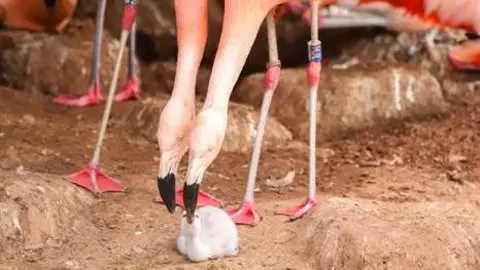Same-sex flamingos hatch a chick at zoo
 Paignton Zoo
Paignton ZooA same-sex pair of flamingos has successfully hatched an egg at a Devon zoo, staff say.
Paignton Zoo said it was also its first round of Chilean flamingo chicks since 2018.
The new additions were the offspring of several flamingo couples who were named by the public earlier this year, including the same-sex pair, Curtis and Arthur.
Although it is not known how Curtis and Arthur acquired the egg, staff said the most likely scenario was that the egg "was abandoned by another couple".
'Successful breeding'
Birds curator Pete Smallbones said same-sex parenting was a "known phenomenon" in flamingos.
He said: “We aren’t entirely sure how this has come about, although it is a known phenomenon in Chilean flamingos, as well as other bird flocks.
"The most likely scenario is that the egg was abandoned by another couple, so this pair have adopted it.”
Other named couples that have hatched chicks include Florence and Flame, Frenchie and Del, and Flossie and Lando.
These flamingos were all named by the public earlier in the year in order to better document the couples as their paired up over the summer.
The initiative, named Love Lagoon, in homage to the reality TV series Love Island, has seen frequent updates posted on the zoo’s social media accounts.
Flamingo eggs hatch after a period of about 28 days, where they are incubated on mud pile nests by both parents.
Mr Smallbones said staff were "pleased at the success of this year’s breeding programme so far".
He said: "It’s a testament to the skill and hard work put in by the bird team, and we are hopeful that we may see more eggs hatch over the coming days and weeks.”
Chilean flamingos are native to south America, and can be found in shallow lakes across various countries.
According to the zoo, the species is declining in the wild due to a number of factors, including egg-harvesting, disturbance by tourism and habitat degradation due to mining.
Follow BBC Devon on X (formerly Twitter), Facebook and Instagram. Send your story ideas to [email protected].
